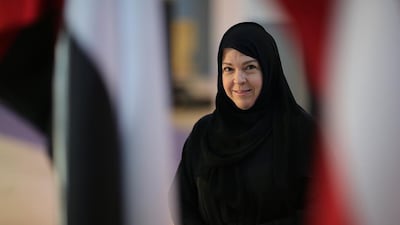ABU DHABI // Khawla Barley was seated in a coffee shop when her nine-year-old son Abdulla Al Mansouri arrived, leaned over and gently kissed his mother on the cheek.
“Hi, Abdulla,” Mrs Barley says, smiling.
Her son’s affectionate greeting is a fitting gesture for a parent who has worked tirelessly to ensure that autistic children such as Abdulla have more opportunities to immerse themselves in the Abu Dhabi community.
Mrs Barley founded and operates Goals UAE, a grassroots, not-for-profit voluntary organisation that partners with local institutions to offer children on the autism spectrum free or low-cost after-school arts, music and sports workshops.
“One reason why I think extra-curricular activities are important is that this is where most people figure out who they are, what they’re good at, where their passions lie, where their talents lie and what they’re not good at,” says Mrs Barley.
“Kids with autism are often very caught-up in school, then life, with a lot of therapy and support and sometimes their personality and their passions and what makes them who they are and what is going to give their life meaning gets lost.”
Before she was a champion of children with special needs, Mrs Barley studied conflict resolution and Middle Eastern studies at the University of Maryland. Her studies initially took her to Dubai for a three-month project in the late 1990s.
“I went out to dinner with my parents and I said, ‘I’m going to go to Dubai in the United Arab Emirates,’ and I remember when we came back to my parents’ house, my mother went to the atlas and her atlas didn’t actually have the UAE at the time. So, that Christmas, my father bought her a new atlas. That was before Dubai or anything was a big deal.”
She returned to the UAE a second time, this time for a project in Abu Dhabi.
“There were no malls in Abu Dhabi when I arrived. The mall was that co-op across from Abu Dhabi Mall,” Mrs Barley says. “There was nothing. But there was also no traffic. There was much less of everything then.”
Fewer people spoke English in the 90s and, Mrs Barley recalls, few, if any, women were seen working in the public sector. Still, she was charmed by Emirati hospitality.
“I found people very friendly and very nice,” says Mrs Barley.
She was also drawn to Islam. Once she settled here, she converted to Islam and adopted the tradition of wearing a black abaya and hijab.
“One thing that attracted me to Islam is the emphasis on learning,” says Mrs Barley. “And Islam is a religion that’s very structured in terms that it covers all aspects of you life.”
In Abu Dhabi, Mrs Barley found work as an elementary school teacher. Her circle of friends included Emirati sisters who introduced her to their brother, who would become Mrs Barley’s husband. They have three children, Safia, 13, Sarah, 11, and Abdulla.
Since it was launched in 2014, Goals UAE has hosted many workshops in partnership with institutions such as New York University Abu Dhabi, Abu Dhabi Arts and Music Festival, Emirates College for Advanced Education and ProActive Soccer School.
Mrs Barley estimates that several hundred children with autism have participated. She is hoping to find a sponsor who can help scale up Goals UAE programming so that more children can benefit.
“What the parents come back and say is a lot of the children were almost like phobic of sports because they’d been bullied or just all their sports experiences had been bad,” says Mrs Barley.
“Goals’ supportive environment gave them their chance to build their confidence, which gave them the chance to focus on building the skills so that now they can actually enjoy it.
“My hope is that now that they have the confidence and they see that they can gather skills, that then they can maybe transfer that back to school or, you know, playing with their cousins or maybe enrolling in another programme.”
rpennington@thenational.ae

